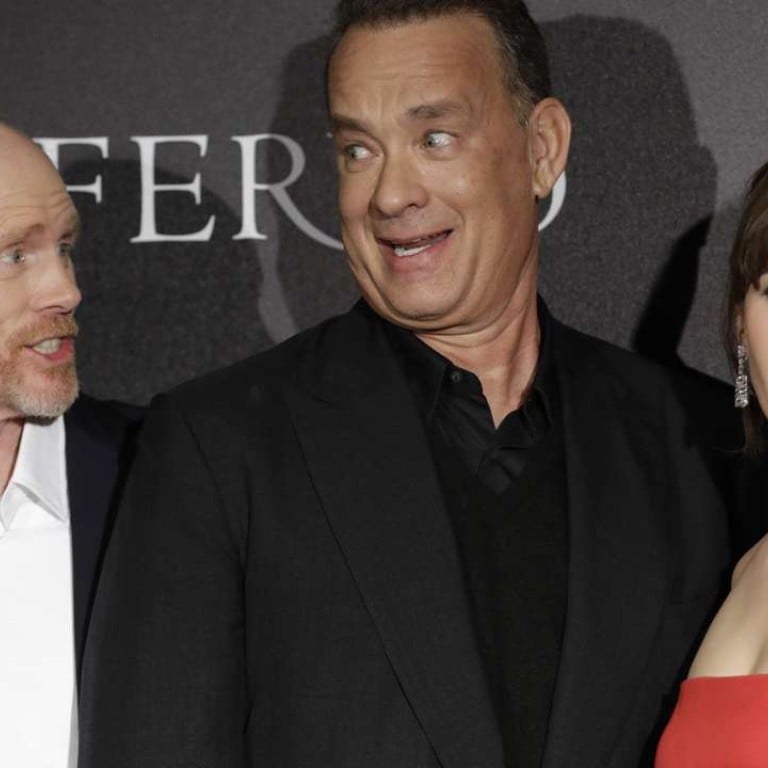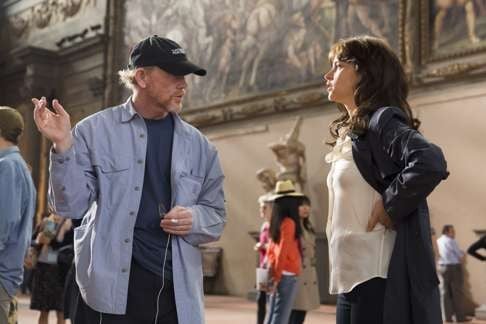
Why Ron Howard is directing Tom Hanks for the third time in Robert Langdon series
Howard is known for his diverse range of films and reluctance to direct franchises or sequels, so even he is surprised to have helmed his third Dan Brown movie
Ron Howard – a franchise director? “I would never have guessed it,” the 62 year-old grins. The veteran filmmaker has never been one for sequels. Coming from Hollywood’s old school, his best films, like Apollo 13, Backdraft and the Oscar-winning A Beautiful Mind, are one-offs. Even though his hit comedies Splash! and Cocoon spawned inferior follow-ups, he’s declined to direct them.
It’s why even he’s surprised that he’s now made three Robert Langdon films. Adapted from the Dan Brown series of books, after 2006’s The Da Vinci Code and 2009’s Angels & Demons , he’s back with Inferno, with Tom Hanks once again reprising the role of Langdon, the Harvard symbologist. “I’ve always taken them, along with Tom Hanks, one at a time,” he says.
While that may be true, Howard’s first two Langdon films are the biggest hits of his career: The Da Vinci Code took US$758 million worldwide; Angels & Demons collected US$485 million. It was always inevitable a third would eventually get made – despite this series garnering Howard some less-than-favourable reviews.
Tom Hanks sees US election warning in thriller Inferno
If this shows that critics and audiences don’t always think alike, Howard argues that Inferno is “very different tonally” to its predecessors. “It’s not like a third episode in a television season,” he says. “They’re always mysteries, there’s always the clue-path and it’s always Robert Langdon, but other than that, tonally the stories have been a little different and the worlds that you travel in are too.”

The film begins as wealthy zealot Bertrand Zobrist (Ben Foster), falls to his death in Florence. Langdon, meanwhile, wakes up in a hospital in the same city – with amnesia and a bullet-graze to the head – and soon finds he’s embroiled in Zobrist’s plot, which is still in play even after his death. As the title of Brown’s novel suggests, the first part of Italian author Dante’s epic three-part poem, The Divine Comedy, will lead the way.

It’s not hard to see why Howard and Hanks have forged such a successful partnership. Even before their Langdon movies, they made Splash! – the 1984 hit mermaid comedy that turned Hanks into a movie star – before reuniting for NASA drama Apollo 13 eleven years later. With Hanks just two years younger, they’re uncannily similar: family men (married to Cheryl for 41 years, Howard has four children – including actress Bryce Dallas) who stand for Hollywood wholesomeness.
“We’re also very like-minded about the opportunities that a movie offers, the excitement, the sense of responsibility to the story and the audience,” says Howard. “So we’re always on the same page – once we agree to do a movie together. But there have been times where we’ve discussed projects and we didn’t see it the same way and we didn’t pursue those. The ones we make together are the ones that we’re passionate about.”

Such is the nostalgic glow that most look back on Howard’s early work, it’s impossible for him to escape. “Every once in a while I bump into an old episode or a movie from before,” he admits, “and occasionally I will see pictures of myself directing… so inevitably you start to count the years and – in this case – the decades. But I’m really fortunate. I started young enough where I feel like I’m in a place where I’ve got a lot of experience behind me and a lot of creative and physical energy.”
Even before he called time on his Happy Days career, Howard was directing – beginning with 1977 B-movie Grand Theft Auto. While it took him five years to make his second, the morgue-set comedy Night Shift , he swiftly followed it with Splash! and the “even more successful” Cocoon.
“My first three studio films provided a sort of momentum. So when they looked at that and saw that all three films were quite different, they – being the ‘system’ – said, ‘He’s spent his life in the business and knows how to apply his experience.’ So I was immediately treated as a veteran.”
A year after Cocoon, in 1986, Howard formed Imagine Film Entertainment with producer Brian Grazer – now a hugely successful entertainment outfit that, among other things, is behind cult sitcom Arrested Development. Meanwhile, Howard is currently attached to direct J.P. Delaney’s ghostly novel The Girl Before, as well as a project about jazz-era icon Zelda Fitzgerald, with Jennifer Lawrence set to take the lead.
Surprisingly, there has yet to be a team-up between Howard and his daughter Bryce, famed for last year’s monster hit Jurassic World .
“My running gag with Bryce is, ‘I don’t know, Bryce, in all my years I’ve worked with a lot of high octane, very emotional but brilliantly talented people, in some of the worst circumstances, at 3 o’clock in the morning, but none of them have ever rolled their eyes at me! I feel it might be wired into the DNA of our relationship!” He breaks into a laugh. “I’m not sure how I could cope with that on set!’”
Inferno opens on November 3
Want more articles like this? Follow SCMP Film on Facebook

 (1).JPG?itok=0BHk6odg&v=1665981271)